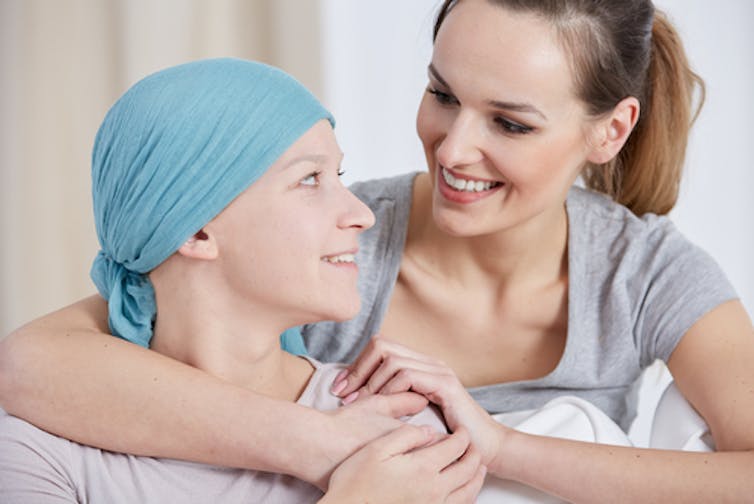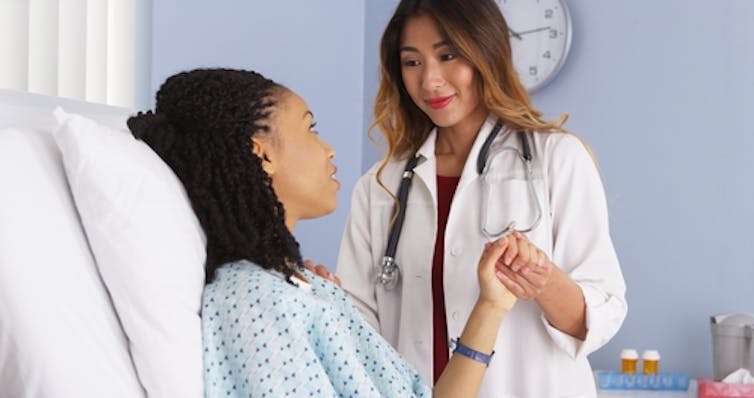What kind of support do breast cancer patients want? Food, rides and prayer
- Written by Tisha Felder, Assistant Professor of Nursing, University of South Carolina
For 31 days every October, pink ribbons and #BCAM hashtags flood our social media timelines with information about breast cancer. That’s because key cancer and medical groups declared October as National Breast Cancer Awareness Month[1] over 30 years ago to raise awareness about the disease and to push for increased funding for research.
Besides skin cancer, breast cancer is the most common cancer among women[2] and the second-leading cause of cancer death among women (lung cancer is the first). According to the National Cancer Institute,[3] about 3.4 million U.S. women were living with breast cancer in 2015.
Once diagnosed, women are faced with making decisions about different treatments. Do they need surgery, chemotherapy and radiation? And what about hormonal drug therapy, which sometimes must be taken as long as 10 years. These are not easy questions. Side effects from these treatments can range from hair loss, nerve damage and memory problems years after treatment. Given these challenges, supporting women during and after breast cancer treatment is vital.
But often, people do not know what to do help besides donning pink. We recently conducted a study to see what kind of support might best help women. We hope that results from our research may help give you some ideas.
What a woman wants
In our study, we looked at how women experienced support[4] during breast cancer treatment. We chose to focus on African-American women because they are more likely to die from breast cancer[5] than all other women in the U.S. We analyzed interviews with African-American women with breast cancer who were previously enrolled in the “placebo group” of a NCI-funded intervention study[6] entitled, “STORY (Sisters Tell Others and Revive Yourself).” In the interviews, we asked the women a range of questions such as “what kind of support did you get from your doctor (and other providers) to help you get through treatment,” to “how did the support you received from others make a difference in your treatment decisions.”
Our results showed that women experienced support in three key ways. Sometimes the support women got met their needs, sometimes it was better than expected, and sometimes it wasn’t. Women shared how they expected cancer care providers to provide them with informational support:
“I received a lot of information, printout information and stuff, and if I had any questions, I was given a number that I called. When I went to the hospital to have my port [for chemotherapy] put in and everything, they were real nice there. They sent me a lot of information and I had a person that if I had any questions she was right there for me. All I had to do was make a phone call and, anything I needed, she was right there.” –Lydia (pseudonym), age 52, 5 years post-diagnosis
 Emotional support from friends and family is very meaningful and helpful to breast cancer patients.
Photographee.eu/Shutterstock.com[7]
Emotional support from friends and family is very meaningful and helpful to breast cancer patients.
Photographee.eu/Shutterstock.com[7]
Women also shared how their family supported them in more emotional ways, such as providing encouragement and being present, and tangible ways, such as cooking meals and house cleaning. Some also expressed how helpful it was that their clergy prayed for them and reminded them “God was going to see me through.”
Second, support exceeded womens’ expectations when cancer care providers encouraged and showed emotional care for the women beyond simply providing treatment information:
“He [my doctor] said, ‘you’ll be fine’. The doctor that he referred me to actually…treated his wife and, of course his wife passed away, but he said she lived a long time. She did very well up under him, and he ended up sending me to the same doctor. And, that kind of eased my mind…because he shared his personal experience with me and that made a difference with my treatment.” –Eddie, age 56, 5 years post-diagnosis
 Women stated that a compassionate doctor helped them deal with their breast cancer diagnosis and treatment.
Rocketclips/Shutterstock.com[8]
Women stated that a compassionate doctor helped them deal with their breast cancer diagnosis and treatment.
Rocketclips/Shutterstock.com[8]
Third, women described situations where the support from others was unhelpful. This often happened when providers, family or friends were unaware of or failed to recognize that the survivor’s needs may have changed:
“(Everyone was) trying to do too much … sometimes you just have to say ‘back off, I’m okay’.” –Shelly Ann, age 64, 6 years post-diagnosis.
Some women even shared that they did not tell the people in their lives that they needed some other form of support because they did not want to be a burden.
Support is crucial
While our study focused on African-American women, results from an analysis of four large studies[9] that included 9,267 women further confirms just how critical support is for women diagnosed with breast cancer. These larger studies showed that women who had limited support from family and friends after their breast cancer diagnosis, had higher risks of their breast cancers coming back, and some even had higher risks of death.
What this means for women with breast cancer is that they should be made aware that assistance from others can have a positive impact on their disease. What this means for those who want to support breast cancer survivors is that family and friends should be open to giving different types of support, as suggested by the American Cancer Society[10] and Komen Foundation[11], such as listening when they want to talk about how they feel, or driving them to a doctor’s appointment.
Family and friends should also be aware that survivors’ support needs may change over time. Key moments when their needs may shift include when they shift from one type of treatment to the next, such as from surgery to chemotherapy, or when they have completed all of their prescribed breast cancer treatments.
Because breast cancer is not a static event, but rather a journey of physical and emotional changes, there is no “one size fits all” approach to supporting women with this disease. Knowing how best to support breast cancer survivors is an ongoing process of changing expectations and needs based on where they may be in their treatment experience.
More research is needed to understand why and how different forms of social support improve breast cancer survival across different groups of breast cancer survivors. In the meantime, let’s keep fighting breast cancer through promoting mammograms and by extending a helping hand to those women in our lives with breast cancer.
References
- ^ National Breast Cancer Awareness Month (www.astrazeneca-us.com)
- ^ most common cancer among women (www.breastcancer.org)
- ^ National Cancer Institute, (seer.cancer.gov)
- ^ how women experienced support (doi.org)
- ^ more likely to die from breast cancer (theconversation.com)
- ^ NCI-funded intervention study (doi.org)
- ^ Photographee.eu/Shutterstock.com (www.shutterstock.com)
- ^ Rocketclips/Shutterstock.com (www.shutterstock.com)
- ^ large studies (www.ncbi.nlm.nih.gov)
- ^ American Cancer Society (www.cancer.org)
- ^ Komen Foundation (ww5.komen.org)
Authors: Tisha Felder, Assistant Professor of Nursing, University of South Carolina

